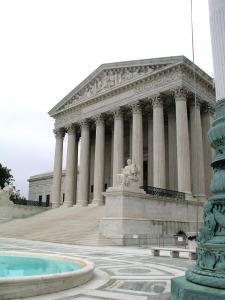By Patrick Southern
On March 25, the Fourth Circuit released a published opinion in the civil case of Johnson v. American Towers, LLC. In its decision, the court affirmed a ruling from the District of South Carolina, declaring that court had properly determined it had jurisdiction over the matter on multiple grounds and had also properly dismissed the claim on the merits.
Plaintiff Was Brutally Attacked In His Home
Plaintiff Robert Johnson worked as a prison guard. He was attacked in his home and shot six times. He survived the attack, and a subsequent investigation revealed that the attack was ordered by an inmate at the prison where he worked, using a contraband cell phone.
The Johnsons sued several cellular phone service providers and owners of cell phone towers (including American Towers), seeking to recover under state law negligence and loss of consortium theories. The defendants fell into two groups: wireless service providers and owners of cellular towers. According to the Johnsons, these defendants were liable for Mr. Johnson’s injuries because they were aware that their services facilitated the illegal use of cellphones by prison inmates and yet failed to take steps to curb that use.
The defendants removed the case to federal court, citing federal question jurisdiction under 28 U.S.C. § 1331 and complete diversity under 28 U.S.C. § 1332. The Johnsons moved to remand to state court, and the District of South Carolina denied the motion on two grounds: (1) that federal question jurisdiction existed because the Federal Communications Act preempted their state law claims, and (2) that diversity jurisdiction existed because the only non-diverse defendants were fraudulently joined and the amount in controversy exceeded $75,000.
The defendants subsequently moved to dismiss the case under Federal Rule of Civil Procedure 12(b)(6). The District Court granted the motion on three grounds: (1) that the Johnsons’ claims were barred by express and conflict preemption; (2) South Carolina law did not impose a duty on the defendants to prevent inmates from illegally using their cell phone services; and (3) the Johnsons’ claims were implausible and so did not meet pleading standards. The Johnsons appealed to the Fourth Circuit.
On Appeal, Plaintiffs Argued on Jurisdictional Grounds In Addition to the Merits of Their Claims
The plaintiffs brought forth two issues the Fourth Circuit considered on appeal.
First, they asked if the District Court had erred in concluding it had federal jurisdiction over the Johnsons’ state law claims. If the Fourth Circuit found federal jurisdiction was proper, they further argued the District Court had improperly dismissed the plaintiffs’ claims on the merits.
The District Court Erred in Finding Federal Question Jurisdiction
The District Court had found federal question jurisdiction existed because the plaintiffs’ state law claims were preempted by the Federal Communications Act. On appeal, the Fourth Circuit noted that this “complete preemption” is rare, and indeed there is a presumption against such preemption. The presumption exists because, in the court’s view, the principles of federalism dictate the judiciary should be careful to not draw an inference that Congressional actions are intended to wipe out wide swaths of state law (at least without some explicit statement as such from Congress).
While the court said the language of the Federal Communications Act constituted “ordinary preemption” it also noted that was not sufficient to create federal subject matter jurisdiction. Only complete preemption can do so. For complete preemption to exist, the preempting statute must provide the exclusive cause of action for claims in the area the statute preempts.
The Fourth Circuit said the Federal Communications Act does not provide the exclusive cause of action in this area, since that statute only permits recovery against common carriers, and the tower owners are not considered common carriers (since they do not provide wireless service). Even though the wireless providers can be sued under the Federal Communications Act, the court noted there was nothing in the Act that indicated Congress intended it to be the exclusive remedy for state law claims against such providers. Indeed, the language of the Act suggests the opposite — that it was not intended to supplant common law and state law remedies.
But Diversity Jurisdiction Allowed the District Court to Hear the Case
With respect to diversity jurisdiction, the Johnsons’ original complaint had named two non-diverse defendants. However, under the “fraudulent joinder doctrine” the District Court was free to remove those defendants and retain jurisdiction over the case. But to do so, there must be a showing that there could not be a claim against the defendants in question even if all questions of law and fact were resolved in plaintiffs’ favor. The standard is obviously plaintiff friendly — if even a “glimmer of hope” of recovery against the defendant at issue is found, it cannot be removed.
But these defendants met that lofty standard. One did not operate towers in the area of South Carolina in question, and so it could not have been found liable for any damages to Mr. Johnson. With regard to the other non-diverse defendant, the Fourth Circuit found that the Federal Communications Act preempted the Johnsons’ claims against it. Thus, it was also removed properly, and diversity jurisdiction was proper.
The District Court Properly Dismissed the Claims on Their Merits
On three different grounds, the Fourth Circuit agreed with the decision of the District Court to dismiss the Johnsons’ claims.
First, it found that the Communications Act’s express language preempted the Johnson’s claims. The court indicated that the existence of a common law tort duty would obstruct or burden a wireless service provider’s ability to provide coverage. The providers would have to actively monitor their networks to prevent calls coming from inside South Carolina prisons, which would limit their ability to offer wireless service in those areas.
Second, it found the Johnsons’ claims were barred by conflict preemption. Conflict preemption applies to state law “when compliance with both federal and state regulations is a physical impossibility, or when state law stands as an obstacle to the accomplishment and execution of the full purposes and objectives of Congress.” The court found that a state law obligation to block calls from inside South Carolina prisons would conflict with parts of the Communications Act which bar actions to block cell phone signals. The provision in question says that no person shall interfere with any radio communications, including his or her own. Thus, a state law obligation to block the signals inside of prisons would directly conflict with the federal law, making compliance with both impossible.
Finally, it found the Johnsons’ claims were implausible. The court indicated the allegations were “speculative” in nature. The Johnsons’ complaint merely asserted that “an inmate at the prison using a cellphone ordered a coconspirator outside of the prison to kill Captain Johnson.” The Fourth Circuit said the Johnsons failed to offer any further facts to support their claims. Their complaint did not identify the wireless service provider who carried the alleged call, or even when the alleged call occurred. Without more factual allegations, the Fourth Circuit said it would be impossible for a district court to assess the Johnsons’ claims.












